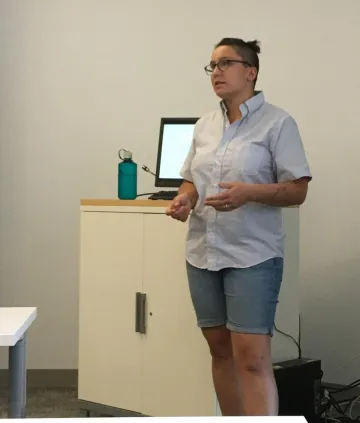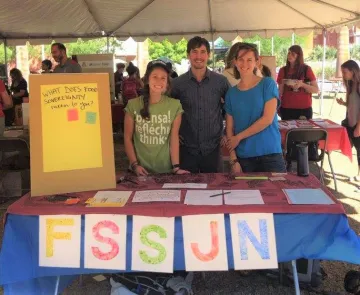The CRFS Research Focus Groups (RFG) program aims at bringing together faculty and graduate students with shared research interests from different colleges, fields, departments, and programs to foster the development of interdisciplinary research agendas.
Convened by individuals from at least two departments/programs, the RFGs meet regularly (at least three times a semester) during the academic year to present works-in-progress, read and discuss texts and current scholarship, and/or plan, develop and implement common research projects. Calls for proposals are solicited by CRFS once per year.
Academic Year 2021-2022
Pima County Food Alliance and the UA Food System Research Lab
In 2021-22, the Center for Regional Food Studies’ research focus group program was awarded to the Pima County Food Alliance (PCFA) to support their new collaboration with UA’s Food System Research Lab. Established in 2011, PCFA is the only food policy council in Pima County and has been integral to advancing several key food-related policies in our region. However, the COVID-19 pandemic and its reliance on an all-volunteer staff has interrupted PCFA’s work in recent years. The research focus group program allowed members of PCFA and the Food Systems Research Lab to hold a series of meetings and visioning workshops during AY2021-22 to restart PCFA’s work. Together, members of PCFA and the Food Systems Lab successfully applied for a Thriving Communities grant from the Community Food Bank of Southern Arizona to revitalize and diversify participation in PCFA over the next two years, including several paid positions. The Food Systems Research Lab provides research and other resources to support the process of reinvigorating and refocusing PCFA’s important work in southern Arizona and linking it with state-level policy efforts spearheaded by the Arizona Food Systems Network.
Academic Year 2018-2019
Food, Health, Wellbeing

The University of Arizona Food Security and Social Justice Network (FSSJN) Presents A Lunchtime Panel on Food, Health, Wellbeing
- Julia Davies (Geography) Addressing the Complex Challenge of Urban Food Insecurity in Secondary Cities of Southern Africa: A Systems-Based Approach
- Eden Kinkaid (pictured) (Geography) Embodied Political Ecologies: Sensing Agrarian Change in North India
- Carly Nichols (Geography) Nutrition Sensitive Agriculture: An Equity-Based Analysis from Central India
- Bonnie Wolf (Public Health) Inventory of Healthy Eating Programs in Southern Arizona
Food Entrepreneurs Research Focus Group
From the farm to the plate, food entrepreneurs are the catalysts for building a more sustainable regional food system. The Food Entrepreneurship Research Focus Group was convened during the Spring 2019 semester to better understand how to support regional food entrepreneurs as they grow, develop, and connect to forge more sustainable enterprises. The group is lead by an interdisciplinary team:
-
Alissa Bilfield: McGuire Center for Entrepreneurship in Eller College of Management
-
Katherine Speirs: Norton School of Family and Consumer Sciences in College of Agriculture and Life Sciences
-
Laurel Bellante: Food Studies Degree in College of Social and Behavioral Sciences
The group convened three Food Entreprenuership Research Focus Group Meetings throughout Spring 2019 among interested faculty, researchers, and community members.
Food Security and Social Justice Network

The Food Security and Social Justice Network (FSSJN) is a group of interdisciplinary graduate students interested in food and agricultural systems. The mission of FSSJN is to facilitate information-sharing, solidarity, and collaboration among food systems and social justice researchers and practitioners. During the Spring 2019 semester, FSSJN used funds from the CRFS Research Focus Groups (RFG) program to host three lunchtime seminars. During these seminars, graduate students studying an array of food themes had the opportunity to present on current and future research, with the goal of promoting collaboration, receiving feedback on research, and generating new ideas. Themes for the seminars included: Agriculture, Climate Change, and the Environment; Food Security, Food Aid, and Food Labor; and Food Health, and Wellbeing. Additionally, FSSJN members used funding to organize on off-campus writing and critical reflection retreat.
Call for Applications
The CRFS Research Focus Groups (RFG) program aims at bringing together faculty and graduate students with shared research interests from different colleges, fields, departments, and programs to foster the development of interdisciplinary research agendas. Convened by individuals from at least two departments/programs, the RFGs meet regularly (at least three times a semester) during the academic year to present works-in-progress, read and discuss texts and current scholarship, and/or plan, develop and implement common research projects.
Eligibility
Applications must be made by two individuals from two different departments; at least one convener must be a faculty member in the College of Social and Behavioral Sciences (SBS). Priority will be given to interdisciplinary projects that open new avenues of research.
Format
A central component of the RFG program is a commitment to fostering dialogue and collaboration among UA faculty members and graduate students around common research goals and trajectories. At least half of the RFG’s meetings should be devoted to research-related events such as works-in-progress presentations by UA faculty and graduate students and discussions of new works in the field.
Budgets and Allowable Expenses
The maximum allowable request under this program is $1,000. The program will permit the following types of funding when adequately justified: reimbursement for travel costs associated with bringing collaborators and speakers to UA, expenses related to the costs of meeting, and honoraria for guest speakers. RFG funds should not be used for cosponsoring departmental speakers and events unless these events are central to the RFG’s work.
Support
The CRFS will offer some administrative and clerical work needed to advertise group events and to keep the groups running smoothly.
Evaluation and Review
A subcommittee of the CRFS Community Advisory Board will review proposals for their quality, their interdisciplinary nature, and their promise of significant results.
To apply, submit a detailed description of proposed activities (up to 2 pages single-spaced), including:
- The research interests of the group.
- The names of the conveners of the group, as well as the names of faculty and graduate students who have agreed to participate in the group and/or strategies for identifying and recruiting members.
- The activities planned for the year, specifying themes, topics, and materials that are likely to be covered. At least half of the RFG’s meetings should be devoted to research-related events such as works-in-progress presentations by local faculty and graduate students and discussions of new works in the field.
- Names of outside speakers (if any) who will be or have been invited.
- A proposed budget for the year’s activities.
Applications should be sent as a single PDF document by email to the Center’s Director, Megan Carney (mcarney@email.arizona.edu) by January 10, 2020. Applicants will be notified of the status of their proposal and funds will be available for groups shortly thereafter.

